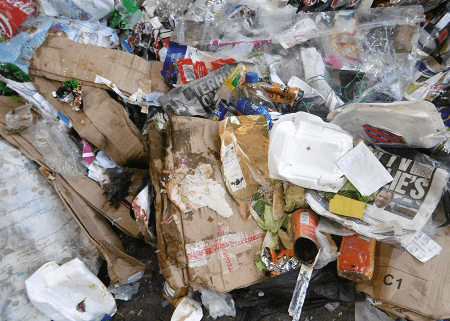More than half a million tonnes of household recycling was rejected at the point of sorting due to contamination in 2019/20, according to the Local Government Association (LGA).
Non-recyclable materials placed in the recycling bin contributed to the rejection of 525,000 tonnes of household recycling, the LGA’s latest figures show.

Around 525,000 tonnes of household recycling was rejected at the point of sorting in 2019/20, the LGA says
The LGA, which represents councils in England and Wales, has called for manufacturers of non-recyclable packaging to front the costs associated with this sorting and disposal.
Councillor David Renard, environment spokesperson for the LGA, said: “Households have made a real shift over the past decade to ensure they are recycling as much as possible, and councils work hard to share information on what can and can’t be recycled.
“However, the manufacturers of plastic packaging products are still continuing to create and sell packaging that cannot be recycled and will be put in the recycling bin by people in good faith. The burden then falls on councils to not only collect it and dispose of it, but to pay the extra cost of disposing of it.
“At a time when councils are working towards achieving net zero, they are doing so with one hand tied behind their back courtesy of manufacturers who are littering our communities with plastic they know cannot be disposed of sustainably.”
EPR
Released on Saturday (27 March), the call from the LGA came three days after the government launched its consultation on extended producer responsibility (EPR).
In the consultation, the government said councils will be able to claim costs associated with “establishing, maintaining and operating facilities required to support the collection and disposal of packaging waste”.
However, it is unclear if this would spread to the cost of dealing with contamination at material recovery facilities (MRFs).
EfW
WRAP’s UK Plastics Pact Annual Report 2019/20 showed 36% of plastic packaging placed on the market at the time was non-recyclable (see letsrecycle.com story). Despite a commitment from the members of the UK Plastics Pact to eliminate the use of plastic cutlery, straws and polystyrene, 20% of the remaining plastic packaging on the market is not recyclable.
“At a time when councils are working towards achieving net zero, they are doing so with one hand tied behind their back”
The LGA says that each tonne of waste collected from a household recycling bin that cannot be recycled costs councils around £93 extra to dispose of through an energy from waste (EfW) facility. By contrast, the cost per tonne of sorting collected recycling through a MRF is around £45, the LGA says. This equates to more than £48 million per year in additional costs.
Cllr Renard says the LGA will work with the government and the waste industry as part of the Environment Bill to ensure the issue of contamination was addressed and to understand the impact of the ban on exports of plastic waste to non-OECD countries. While exporting waste was never a suitable solution, Cllr Renard says, the sudden additional responsibility and cost for councils is “clearly” a concern.
Councils
City of Bradford metropolitan district council reported a 15% rise in recycling contamination in some areas during the pandemic (see letsrecycle.com story). The additional costs for collecting and processing this waste in comparison to pre-Covid levels is around £208,000 per month. This sharp rise in contamination has resulted in an extra £800,000 forecasted cost.

Bradford metropolitan district council reported a 15% rise in contamination levels in some areas during the Covid-19 pandemic
Broxbourne council announced on 17 March it had seen a “significant” increase in contaminated recycling material in kerbside recycling boxes and bins at recycling points. The main contamination is from plastic carrier bags and plastic sacks which are used to contain or separate recyclables, the council says.
Definition
The high level of waste rejected at the point of sorting could become more significant when the EU’s definition of recycling is implemented (see letsrecycle.com story).
Under this definition, recycling is measured ‘further up the line’ based on what comes out of a sorting facility, rather than what goes into it, as is currently the case. This new definition will be used to measure progress against 2025 targets.
The post LGA calls for producers to pay for contamination appeared first on letsrecycle.com.
Source: letsrecycle.com Plastic


